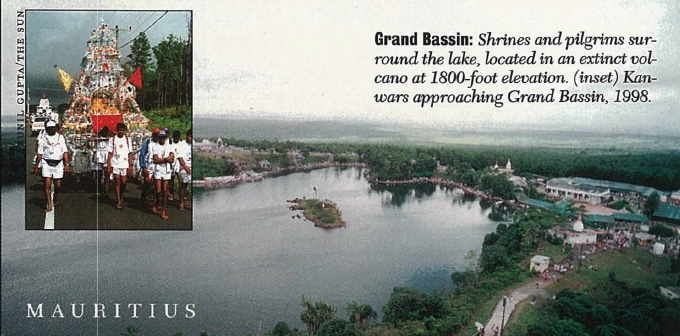Report by SUNIL P. GOPAL
One advantage of running a country is that when there is a problem, you can do something about it. So when the Prime Minister of Mauritius, Dr. Navonchandra Ramgoolam, and his family got stuck in the 60,000-car, five-hour traffic jam of pilgrims heading for Grand Bassin lake as part of the yearly Maha Sivaratri festival, he took action. Because many pilgrims were unable to complete their trek to the lake, Dr. Ramgoolam declared the following day, Monday, February 23rd, a holiday–he also cashiered the police inspector in charge of traffic. Hindus were delighted with the added holiday, but the country’s leading newspapers–operated by non-Hindus–blasted the decision. One business manager complained that up to 80% of workers were absent the next day, and estimated the resulting loss at US$6.8 million. Hindu leaders came to the PM’s defense, saying the unusual conditions justified the special holiday.
Sivaratri in Mauritius is a multi-day affair, because the main form of observance is to either drive or walk to Grand Bassin, a large lake in the middle of the island. There devotees worship at the many shrines around the lake, then return home with a pot of sanctified water. It can take two days to walk there, and two back. Those with sore feet can, without censure, take a bus home.
Vimalen Rengapen, 21, of Riviere-du-Rempart, made the pilgrimage on foot, a 12-hour, 50-km trek. He arrived at Grand Bassin at one in the morning, soaking wet from the rain and shivering with cold. “It was really very hard to walk such a long distance. But on reaching, I could not believe how beautiful it was. We worshiped Lord Siva, sang His hymns and kept awake throughout the whole night to earn His grace.”
This year’s festival was special, for it was one hundred years ago that Jhummun Giri Gossagne Napal, a temple priest, saw in a dream devas (angels) dancing around the lake singing praises to Lord Siva. He and other religious leaders declared the lake a tirtha, place of pilgrimage, unique to Mauritius, and as sacred as the Ganges. In 1998, 300,000 Hindus–50% of all Hindus on the island–made the pilgrimage, despite dreary weather and the traffic jam.
Some pulled or carried kanwars, a chariot or arch decorated with colored paper. Kanwars range from simple affairs to recreated temples, Deities, even houses and one year’s 7-meter by 10-meter Boeing 747. Elaborate creations cost up to US$2,000, and are cooperative efforts by family and friends.
This tradition of carrying kanwars (as more modest decorated arches) is followed in North India [see March, 1998] in June and July. There devotees walk from their villages hundreds of kilometers to Haridwar and return with Ganges water. In Mauritius the North Indian community adapted this practice to Sivaratri and now, as with Thai Pusam, most Hindus participate.
THAI PUSAM
MURUGAN’S FESTIVAL FERVOR
A TIME FOR PENANCE
Report by Sunil P. Gopal, Mauritius
Tears would run down my cheeks, and I would lose consciousness when I saw the kavadi procession, even though I was only eleven,” recalls Mrs. Maliga Nagalingum, of Port Louis, Mauritius. Now 52, she has carried kavadi in honor of Lord Murugan each of the last twenty years. Thousands of other Hindus of Tamil origin have done the same every February since the community’s arrival on the island 150 years ago. Many Hindus join in, now making it a major festival of the year for Mauritius.
A kavadi is a highly decorated pole or arch carried by a devotee from a designated starting point to a temple. “To carry kavadi entails a lot of preparation, especially at the spiritual level,” explains Rama Armoogum, 21, a student in at the University of Mauritius. “You have to sleep on a mat and eat only veggie food.” The whole family will join in making the kavadi, which can become quite an elaborate affair, towering ten feet or more over the devotee. Many have their bodies pierced with small spears. Women usually carry pal kavadi, a big brass pot of milk, on their head, and pierce their cheeks and tongue. What is it like? Rama says, “Words are too feeble a medium to explain the intense feelings when you carry kavadi.”
